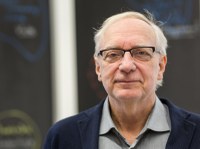Panel on Planetary Thinking
Viewing Planet Earth in its entirety from a broad perspective

Prof. Dr. Claus Leggewie – Foto: JLU / Rolf Wegst
The coronavirus pandemic has made it all the more clear to us: We cannot think, search for, or find answers to great contemporary questions and challenges within traditional academic disciplines. Not only during the current crisis do we need an overall planetary perspective. With the "Panel on Planetary Thinking," the JLU explores precisely this path. The recently launched project on "planetary thinking" takes up questions within sustainability science and takes into account complex phenomena such as interactions between the earth system and societies, biodiversity, and climate or global social inequality from an ecological, economic, social, cultural, and political overall perspective.
public. The JLU will initially finance the project from its own funds for two years. After a successful initial phase, an institutionalisation of the "Panel on Planetary Thinking" is planned.
JLU President Prof. Joybrato Mukherjee thanks Prof. Leggewie for initialising the project in the first place: "At the JLU, we are very aware of our responsibility to society as a whole. I am convinced that the 'Panel on Planetary Thinking' will have an impact on the university as a whole and provide important impulsesfor research, teaching, and transfer – especially in order to strengthen the topic of sustainability, which is a strategic cross-sectional task of the 'Development Plan JLU 2030' (Entwicklungsplan JLU 2030). Moreover, transfer plays an important role – in the sense of scientifically-supported advice for actors in politics and society on the one hand, and through a variety of public event formats on the other hand, from which the civil society will also benefit."
The journal Nature recently headlined an article entitled "Coronavirus lockdowns have changed the way Earth moves." "There could hardly be a more pertinent observation during the launch of the 'Panel on Planetary Thinking,' which began its work at the beginning of April," explains political scientist Prof. Leggewie. "If we put ourselves in the position of a planet, a human being is ultimately a force similar to a meteorite impact, and urban infrastructures such as coral reefs form a biologically produced rock," he adds. According to Prof. Leggewie, the "Panel on Planetary Thinking" invites us to perceive human coexistence on earth by understanding Earth as an ever-changing planet: from its core to interplanetary space and from nanosecond to deep time. "We should explore interactions between the planet and humankind and present possible alternatives, not least on the basis of scientifically-proven findings on the transgression of planetary boundaries," explains Prof. Leggewie, who was active in the prestigious German Advisory Council on Global Change ("Wissenschaftlicher Beirat der Bundesregierung Globale Umweltveränderungen," WBGU ) between 2008 and 2016.
"The panel aims at exploring planetary thinking as a form of an emerging planetary system of knowledge, which begins to evolve out of research on the Anthropocene, the earth system, and sustainability. The panel thereby also addresses questions about knowledge production and use, since the way we experience the world and how we coexist have a mutual influence," Dr Hanusch adds, who changed to Giessen from the well-known "Institute for Advanced Sustainability Studies" in Potsdam.
At the JLU, this knowledge should be pooled in order to create the basis for a research perspective that participates in leading international debate. Moreover, the "Panel on Planetary Thinking" should exert an influence in the areas of research, teaching, and the "Third Mission" by contributing to the JLU's profile as a "workshop for future sustainable social development." With its scientific expertise, the panel accompanies the planning and implementation of a sustainability strategy at the JLU as a whole, as delineated in the "Development Plan JLU 2030" (Entwicklungsplan JLU 2030). These steps are taken within the framework of the recently signed "Hessischer Hochschulpakt 2021-2025," an agreement between Hessen-based universities which describes sustainability among the political goals as "playing an important role regarding the scientific knowledge on the transgression of planetary boundaries in every university (planetary thinking)" (Chapter I.10).
Individuals
Prof. Claus Leggewie has held the chair of the Ludwig Börne Professorship at the JLU since the winter semester of 2015/16. At the JLU, he taught as a political scientist from 1989 to 2007. Together with Prof. Henning Lobin, he founded the Centre for Media and Interactivity (Zentrum für Medien und Interaktivität, ZMI) at the JLU in 2001. Between 2007 and 2017, Prof. Leggewie was the director of the Institute for Advanced Study in the Humanities (Kulturwissenschaftliches Institut, KWI) in Essen and the Centre for Global Cooperation Research in Duisburg. He is a member of the board of directors of the ZMI.
Dr. Frederic Hanusch has been the scientific director of the "Panel on Planetary Thinking" since April 2020. In addition to coordinating the Panel, he conducts research on planetary change and democracy. Most recently, he worked as a research group leader at the Institute for Advanced Sustainability Studies (IASS) in Potsdam. His latest publications include Democracy and Climate Change (Routledge) and Deep-time organizations: Learning institutional longevity from history (The Anthropocene Review).
- Further information
Twitter: @planetarypanel
- Contact
Prof. Dr. Claus Leggewie
Ludwig Börne Professor, Justus Liebig University Giessen
Dr. Frederic Hanusch
Scientific Director, "Panel on Planetary Thinking"
Centre for Media and Interactivity (ZMI)
Ludwigstraße 34, 35390 Giessen
Phone: +49 641 99-16351

